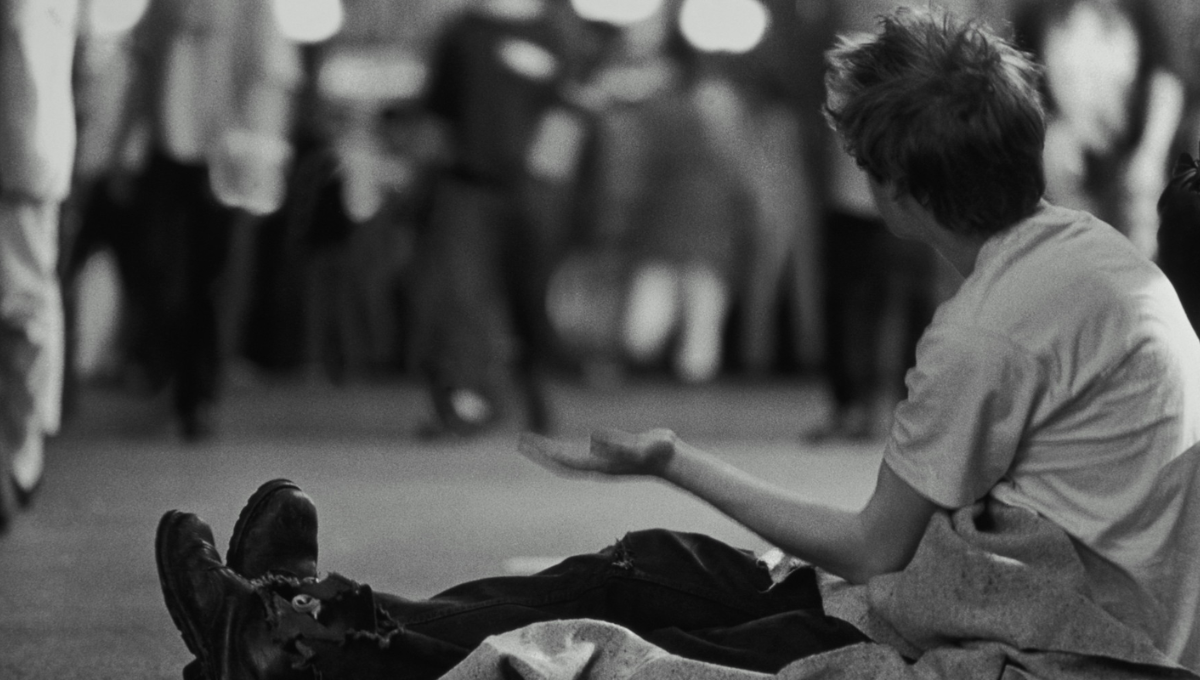Begging on the streets is a global phenomenon that is sometimes misinterpreted. It demonstrates the difficulty of living for those who are poor and isolated from the rest of society.
It’s not unusual to encounter a street beggar with outstretched hands and a pitiful expression in many major cities. When people’s situations deteriorate to that point, they need the kindness of complete strangers just to survive. Begging on the streets is a glaring indicator of poverty that highlights the significant gaps that still exist in our society.
A street beggar is someone who approaches strangers on the street, sidewalk, or at a bus stop and asks for money, food, or other assistance. They lack the resources to provide for themselves, as they are typically without a home or are living in extreme poverty.
Begging on the streets is often a symptom of poverty. They are usually forced to resort to begging as they are unable to secure gainful employment. People living in poverty are trapped in a cycle of despair that keeps them turning to beggars on the streets.
Due to a lack of educational opportunities and employment resources, street begging is all too common. Jobs that pay a living wage are out of reach for those who lack the necessary education and experience. This forces them into a position of asking for charity.
Problems at home, physical abuse, and substance abuse are other common pathways to homelessness and a life of begging. Lack of resources compounds the difficulties already experienced by homeless people living on the streets.
People who beg on the streets typically receive negative attitudes and treatment from the general public. Judgments, misunderstandings, and negative preconceptions make it difficult for them to break out of poverty and push them farther into the background.
The health and safety of persons who choose to live on the streets are compromised. Lack of access to adequate sanitation facilities, inclement weather, and the possibility of violent and criminal acts are just a few of the daily threats they confront.
Some people use drugs as a coping mechanism to deal with the realities of living on the streets. Using drugs is a never-ending cycle that only makes things worse for homeless people trying to make ends meet.
When someone begs on the street, it doesn’t simply affect them. The ripple effects are felt across the community. If you want to find a solution to street begging, you need to know how it impacts society. The local economy can be negatively impacted when people start asking for money on the street.
Evidence of widespread poverty and inequality that threatens economic development. Evidence of widespread poverty and inequality that threatens economic development.
In addition, if we always expect the public to help, we may not have enough money to invest in addressing the root causes of poverty, such as providing people with secure employment and social safety nets. Everyone has an obligation to help those who are forced to beg in public spaces.
The way society views empathy, compassion, and social justice needs to evolve. Society may strive toward permanent solutions to issues like poverty, injustice, and social exclusion by learning what motivates people to beg on the streets.
We can assist those who are homeless and begging by doing the following:
- Help those who are struggling by giving to local charities that aid those who are homeless and begging on the streets.
- Fund initiatives that help those who are begging on the streets to get the education and skills they need to find gainful employment.
- Fighting for inclusive growth and job creation legislation.
- Motivate businesses and sectors to take on unemployed workers.
We can end the cycle of street begging and equip individuals to live with dignity if we aid organizations, provide job training, and provide employment opportunities for them.
বাংলা অনুবাদ
রাস্তায় ভিক্ষা করা একটি বিশ্বব্যাপী ঘটনা যা কখনও কখনও ভুল ব্যাখ্যা করা হয়। যারা দরিদ্র এবং সমাজের বাকি অংশ থেকে বিচ্ছিন্ন তাদের জীবনযাপনের অসুবিধাকে এটি প্রদর্শন করে।
অনেক বড় শহরে প্রসারিত হাত এবং একটি করুণ অভিব্যক্তি সহ রাস্তার ভিক্ষুকের মুখোমুখি হওয়া অস্বাভাবিক নয়। যখন মানুষের পরিস্থিতি সেই পর্যায়ে খারাপ হয়ে যায়, তখন তাদের বেঁচে থাকার জন্য সম্পূর্ণ অপরিচিতদের দয়া প্রয়োজন। রাস্তায় ভিক্ষা করা দারিদ্র্যের একটি উজ্জ্বল সূচক যা আমাদের সমাজে এখনও বিদ্যমান উল্লেখযোগ্য ফাঁকগুলিকে তুলে ধরে।
রাস্তার ভিক্ষুক হল এমন একজন যিনি রাস্তায়, ফুটপাতে বা বাস স্টপে অপরিচিত লোকের কাছে যান এবং অর্থ, খাবার বা অন্যান্য সহায়তা চান। তাদের নিজেদের জন্য সরবরাহ করার জন্য সংস্থান নেই, কারণ তারা সাধারণত বাড়ি ছাড়াই থাকে বা চরম দারিদ্রের মধ্যে বসবাস করে।
রাস্তায় ভিক্ষা করা প্রায়শই দারিদ্র্যের লক্ষণ। লাভজনক কর্মসংস্থান নিশ্চিত করতে না পারায় তারা সাধারণত ভিক্ষাবৃত্তি অবলম্বন করতে বাধ্য হয়। দারিদ্র্যের মধ্যে বসবাসকারী লোকেরা হতাশার চক্রে আটকা পড়ে যা তাদের রাস্তায় ভিক্ষুক হয়ে উঠতে থাকে।
শিক্ষার সুযোগ এবং কর্মসংস্থানের অভাবের কারণে, রাস্তায় ভিক্ষা করা খুবই সাধারণ ব্যাপার। জীবিকার মজুরি প্রদানকারী চাকরি যাদের প্রয়োজনীয় শিক্ষা এবং অভিজ্ঞতার অভাব তাদের নাগালের বাইরে। এটি তাদের দাতব্য চাওয়ার অবস্থানে বাধ্য করে।
বাড়িতে সমস্যা, শারীরিক নির্যাতন, এবং পদার্থের অপব্যবহার হল গৃহহীনতা এবং ভিক্ষাবৃত্তির জীবনের অন্যান্য সাধারণ পথ। সম্পদের অভাব রাস্তায় বসবাসকারী গৃহহীন মানুষদের দ্বারা ইতিমধ্যেই সম্মুখীন হওয়া অসুবিধাগুলিকে আরও জটিল করে তোলে৷
যারা রাস্তায় ভিক্ষা করে তারা সাধারণত সাধারণ জনগণের কাছ থেকে নেতিবাচক মনোভাব এবং আচরণ পায়। বিচার, ভুল বোঝাবুঝি এবং নেতিবাচক পূর্ব ধারণা তাদের জন্য দারিদ্র্য থেকে বেরিয়ে আসা কঠিন করে তোলে এবং তাদের পটভূমিতে ঠেলে দেয়।
যারা রাস্তায় বাস করতে পছন্দ করেন তাদের স্বাস্থ্য ও নিরাপত্তার সাথে আপস করা হয়। পর্যাপ্ত স্যানিটেশন সুবিধার অ্যাক্সেসের অভাব, দুর্যোগপূর্ণ আবহাওয়া এবং হিংসাত্মক ও অপরাধমূলক কর্মকাণ্ডের সম্ভাবনা তাদের মুখোমুখি হওয়া দৈনন্দিন হুমকির কয়েকটি মাত্র।
রাস্তায় জীবনযাপনের বাস্তবতা মোকাবেলা করার জন্য কিছু লোক মাদককে মোকাবিলা করার পদ্ধতি হিসেবে ব্যবহার করে। মাদক ব্যবহার করা একটি অন্তহীন চক্র যা শুধুমাত্র গৃহহীন লোকেদের জন্য জিনিসগুলিকে আরও খারাপ করে তোলে যা শেষ করার চেষ্টা করে৷
যখন কেউ রাস্তায় ভিক্ষা করে, এটি কেবল তাদের প্রভাবিত করে না। লহরের প্রভাব সমগ্র সম্প্রদায় জুড়ে অনুভূত হয়। আপনি যদি রাস্তায় ভিক্ষাবৃত্তির সমাধান খুঁজতে চান, তাহলে আপনাকে জানতে হবে এটি সমাজকে কীভাবে প্রভাবিত করে। স্থানীয় অর্থনীতি নেতিবাচকভাবে প্রভাবিত হতে পারে যখন লোকেরা রাস্তায় টাকা চাইতে শুরু করে।
ব্যাপক দারিদ্র্য এবং বৈষম্যের প্রমাণ যা অর্থনৈতিক উন্নয়নকে হুমকি দেয়। ব্যাপক দারিদ্র্য এবং বৈষম্যের প্রমাণ যা অর্থনৈতিক উন্নয়নকে হুমকি দেয়।
উপরন্তু, আমরা যদি সর্বদা জনসাধারণের সাহায্যের আশা করি, তাহলে আমাদের কাছে দারিদ্র্যের মূল কারণগুলি যেমন নিরাপদ কর্মসংস্থান এবং সামাজিক নিরাপত্তা জাল প্রদানের মতো মোকাবেলায় বিনিয়োগ করার জন্য যথেষ্ট অর্থ নাও থাকতে পারে। যারা পাবলিক স্পেসে ভিক্ষা করতে বাধ্য হয় তাদের সাহায্য করার জন্য প্রত্যেকের বাধ্যবাধকতা রয়েছে।
সমাজ সহানুভূতি, সহানুভূতি এবং সামাজিক ন্যায়বিচারকে যেভাবে দেখে তা বিকশিত হওয়া দরকার। সমাজ দারিদ্র্য, অবিচার এবং সামাজিক বর্জনের মতো সমস্যার স্থায়ী সমাধানের জন্য চেষ্টা করতে পারে যা মানুষকে রাস্তায় ভিক্ষা করতে অনুপ্রাণিত করে তা শিখে।
আমরা নিম্নোক্ত কাজগুলো করে যারা গৃহহীন এবং ভিক্ষা করে তাদের সহায়তা করতে পারি:
যারা গৃহহীন এবং রাস্তায় ভিক্ষা করে তাদের সাহায্য করে এমন স্থানীয় দাতব্য সংস্থাকে দিয়ে যারা সংগ্রাম করছে তাদের সাহায্য করুন।
তহবিলের উদ্যোগ যা রাস্তায় ভিক্ষা করে তাদের শিক্ষা এবং দক্ষতা অর্জন করতে সাহায্য করে যা তাদের লাভজনক কর্মসংস্থান খুঁজে পেতে হয়।
অন্তর্ভুক্তিমূলক প্রবৃদ্ধি এবং কর্মসংস্থান সৃষ্টি আইনের জন্য লড়াই।
বেকার শ্রমিক নিতে ব্যবসা এবং সেক্টর অনুপ্রাণিত.
আমরা রাস্তায় ভিক্ষাবৃত্তির চক্রের অবসান ঘটাতে পারি এবং ব্যক্তিদের মর্যাদার সাথে বাঁচতে সজ্জিত করতে পারি যদি আমরা সংস্থাগুলিকে সহায়তা করি, চাকরির প্রশিক্ষণ প্রদান করি এবং তাদের জন্য কর্মসংস্থানের সুযোগ প্রদান করি।
গুরুত্বপূর্ন শব্দের অর্থ
Begging – ভিক্ষা (Bhiksha), 2. Poverty – দারিদ্র্য (Daridrya), 3. Isolated – একাকী (Ekaki), 4. Society – সমাজ (Samaj), 5. Pitiful – দুঃখজনক (Dukkhajonok), 6. Strangers – অপরিচিত (Aporichit), 7. Survival – অবসর (Abosor), 8. Indicator – সূচক (Suchok), 9. Gaps – অনুপাত (Anupat), 10. Gainful employment – মার্জিত কর্মস্থল (Marjit Karmosthol), 11. Education – শিক্ষা (Shiksha), 12. Experience – অভিজ্ঞতা (Abhijnata), 13. Homelessness – বাসহীনতা (Bashhinota), 14. Preconceptions – পূর্বাগ্রাহী ধারণা (Purbagrahi Dharona), 15. Sanitation – স্বাস্থ্যনির্বাহ (Swasthyanirvah), 16. Inclement weather – অমনোহবমান আবহাওয়া (Amonohoboman Abhawa), 17. Substance abuse – পদার্থ ব্যবহারের সমস্যা (Padarth Byaboharer Samasya), 18. Empathy – সমবেদনা (Samabedona), 19. Compassion – দয়া (Doya), 20. Social justice – সামাজিক ন্যায় (Samajik Nyay), 21. Charities – চারিটি (Chariti), 22. Education – শিক্ষা (Shiksha), 23. Skills – দক্ষতা (Dokkhota), 24. Employment – চাকরি (Chakri), 25. Inclusive – সমাবেশী (Samabeshi), 26. Growth – বৃদ্ধি (Briddhi), 27. Job creation – কাজ সৃষ্টি (Kaj Shrishti), 28. Motivate – অনুপ্রেরণ করা (Anuprerona Kora), 29. Business – ব্যবসায় (Byabshay), 30. Dignity – গর্ব (Gorb).

